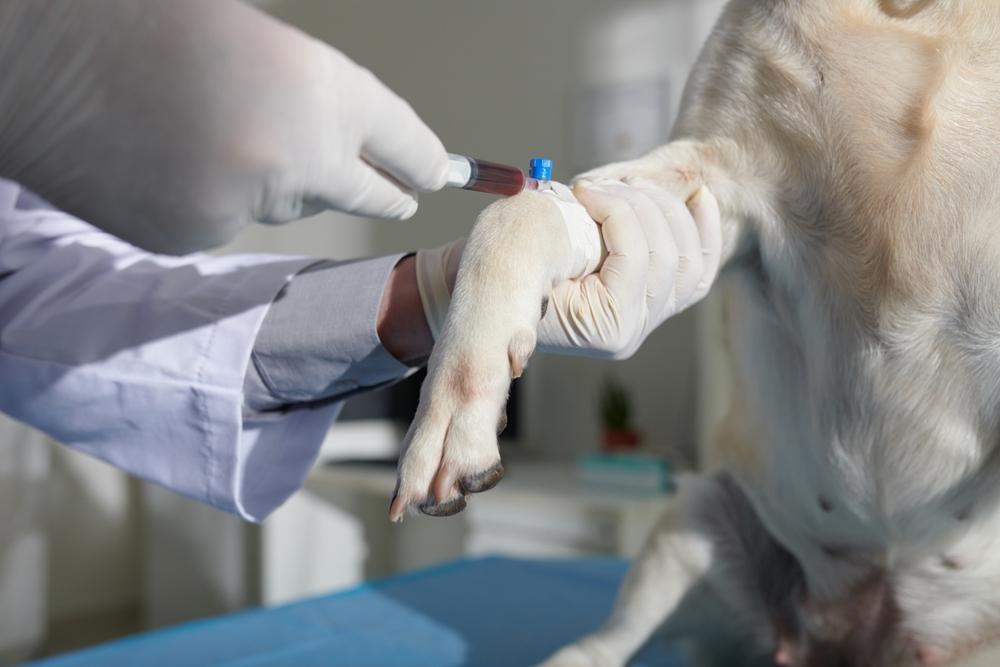Some people share a common misconception about when to bring their pet to the veterinarian. While your pet absolutely needs veterinary care when they are sick or injured, wellness screenings are equally—if not more—important to your furry pal’s health. Many diseases do not cause clinical signs until they become advanced, and early diagnosis can often provide more effective treatment options. Routine wellness screening tests are an essential part of your pet’s veterinary care and should be performed at every wellness visit, regardless of how healthy they appear.
To highlight regular wellness screenings’ importance, our Central Kentucky Veterinary Cares team describes the most common wellness screening tests and explains the valuable information they provide.
Common routine wellness screening tests for pets
Most adult pets should have yearly veterinary wellness visits. During these visits, your veterinarian will do a thorough physical examination and depending on your pet’s age, lifestyle and health status, they may perform the following common screening tests:
- Blood tests — Blood testing establishes your pet’s normal baseline and can reveal abnormalities, which allows for early disease treatment. Blood testing usually includes:
- Complete blood count (CBC) — A CBC evaluates and quantifies your pet’s red blood cells, white blood cells, and platelets. A CBC commonly detects anemia, blood loss, blood-based cancers (e.g., lymphoma, leukemia), infection, and inflammation, and can also indicate immune-mediated diseases.
- Blood chemistry panel — A blood chemistry panel evaluates your pet’s organ function and can help determine their hydration status. Important blood chemistry panel results include kidney and liver function, blood sugar level, and serum protein level.
- Fecal test — Fecal testing is essential in the identification and treatment of intestinal parasites, which are common among pets, although they are easily deterred through heartworm preventive administration. A small stool sample can reveal parasite eggs that leach pets’ nutrition and cause gastrointestinal (GI) issues.
- Heartworm and blood-borne parasite testing — Heartworm infections are easily prevented with year-round monthly parasite preventive administration. However, left untreated, heartworm and tick-borne diseases can cause pets serious health concerns and potentially death. Regular testing ensures treatment can be started promptly if a pet tests positive for one of these deadly parasitic infections.
Depending on your pet’s basic wellness screening test results and their age, lifestyle and health status, your veterinarian may recommend a few extra diagnostics. Additional screening tests may include:
- Urinalysis — A urinalysis evaluates your pet’s kidney function and can be used to detect urinary tract infection (UTI) and urinary crystals. Diabetic and senior pets often need regular urine testing to monitor urinary tract health.
- Blood pressure — A blood pressure test measures the blood’s pressure against the large arteries’ walls. Senior pets are more likely to develop hypertension—a disease associated with high blood pressure—in conjunction with other health issues such as heart disease.
- Thyroid testing — A thyroid test evaluates the thyroid gland’s function and can detect hypothyroidism in dogs and hypertension in cats.
The value in your pet’s normal wellness screening test results

When your pet appears perfectly healthy, you may believe their wellness visit and screening tests are unnecessary. However, these preventive care measures help your pet live a longer, healthier, happier life. Wellness screening tests are incredibly important for several reasons, including:
- Detecting diseases early — Regular wellness screenings can help your pet’s veterinarian identify hidden health problems long before your pet exhibits disease signs, improving their outcome and minimizing treatment time and cost.
- Establishing your pet’s health baseline — Your veterinarian performs regular wellness screening tests to determine your pet’s normal baseline values. Knowing your pet’s baseline diagnostic testing results allows your veterinarian to see what your pet’s normal is if they become sick. The more your veterinarian knows about your pet when they are healthy, the more likely they will be able to identify subtle changes long before your furry pal becomes seriously ill
- Monitoring your pet’s health over time — Over the years, your pet’s health status may change, and by comparing test results over time, your veterinarian can monitor trends and note significant changes based on your pet’s baseline results. This enables your veterinarian to take action very early on in the disease process to halt or slow negative trends’ progression.
Ensuring your pet receives regular wellness screening is key to helping maintain their health. To schedule your pet’s annual wellness visit, contact our Central Kentucky Veterinary Center team for an appointment.







Leave A Comment